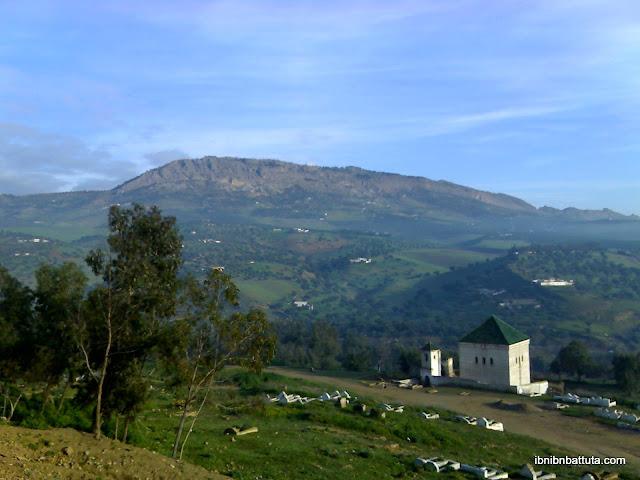A Mountain That Can Be Climbed, But Never Conquered
 |
| Seen from Bab Guissa, Jebel Zalagh arcs like a stony spine on the horizon. From the summit, the Atlas Mountains' snows are visible. |
Before heading out, I spoke to several friends who had made the climb before. Their advice was slightly unsettling—on the way up the mountain, watch out for territorial farmers and their even more territorial dogs.
Is there a certain path I should take? I wondered. Not really, they said. Just head for the radio towers at the summit, and look out for the dogs. Oh, and also for the thieves at the top who stole our friend's backpack.
Great, I thought. One of those trips.
* * *
Early this morning I walked through the quiet streets to Bab Guissa, at the medina's northern edge. With my friends' words of warning in mind, I had packed light, bringing only the clothes on my back and hiking boots on my feet, one cell phone, and one grocery bag with fruit and water.
The sky was cloudless, the air crisp and radiant with sun—a rare day in the Fes winter. I crossed the main road out of town and, setting my bearings toward the radio towers, stepped onto a muddy path heading into the farmland at the mountain's foot.
Just a stone's throw from one of Morocco's largest cities, the countryside took on a serene, Shire-like charm (sans hobbits, unfortunately). Small homes nestled along the hillsides among wobbly rows of squash, melons, and other crops. I crossed an arched, earthen bridge spanning a stream, and entered a series of olive groves that began to slope upward toward the mountain. White and golden wildflowers bloomed between the trees. The landscape was swollen with greenery, lush from the winter's copious rains.
I passed more farm houses, and occasionally heard a dog barking in the distance. But only a single self-appointed guard-donkey brayed as I squelched along the muddy track. My new hiking boots, each caked in a blob of sodden clay, weighed a few pounds more than when I had started, and felt less comfortable by the minute.
At 10:00 AM I paused for a water break, having nearly reached the upper limits of the olive groves. By this time a few locals were beginning to appear, and a picnicking couple pointed me in the direction of the summit route. I broke out of the trees and began scrambling up the steep, crumbling rock of the mountain's upper face.
* * *
An hour later I dragged my body the final few steps up to the summit, my feet rubbed raw and my leg muscles screaming, and plopped down on a rock. The view from the peak was stunning—Fes lay before me, surrounded in all directions by a rippling sea of verdant hillsides. Mist, though fast disappearing, still hung in each valley. In the distance to the south and east, the jagged triangles of the Middle Atlas rose from the horizon, glistening white with snow.
From this height, the Fes medina was pleasantly distant—nothing more than a smudge of brown in the valley below me.
* * *
As I finally wrestled my socks and boots back onto my aching feet and prepared to descend, two soldiers walked up behind me, presumably from their guard post beside the radio towers. We greeted each other hesitantly, and they immediately demanded to see the contents of my plastic grocery bag. (Such is life outside of western democracies.)
"Trash, and water," I replied. "Would you like some?" I smiled inside, recognizing their disappointment at seeing that I carried no fancy camera, military equipment, or schematic designs of radio towers (any of which would have confirmed their suspicions that I was a spy for some western government). It's called a camera phone, fellas, and no, I don't want to stay and chit-chat.
* * *
After skittering down the loose rocks near the summit, I found a muddy trail and tried to retrace my steps back to town, zigzagging between the fruit trees and planted fields. Only once I quickened my pace as a dog, hackles raised and teeth bared, ushered me away from its litter of puppies.
At one fork, several paths seemed to trail off among the farms. I hailed a man reclining under a tree, watching his flock of sheep graze, and asked him to point out the quickest path toward the medina.
In response, he launched into a rapid, completely unintelligible mumble.
"Huh?"
Slowing down now, he continued to mumble, "See that olive tree over there?"
"Uhhh..."
The shepherd was pointing to a small stand of olive trees, off to the side of a lone olive tree, in front of a field of olive trees, framed by a horizon lined with olive trees.
"Yeeaaaah, I see it."
I nodded politely through the rest of his directions, which ended several minutes later with "It doesn't matter—all the paths lead back to Fes just the same."
"God bless you. God be merciful to your parents." I said in traditional thanks, and squelched off in the direction he had pointed.
* * *
An hour later, I reached Bab Guissa, and headed back toward our house, still squelching, along the medina's own muddy paths. A smile of familiarity played on my lips—on my hike to the mountaintop, I had found the peace I sought, but the Moroccans, ever relentless, had made their presence felt.
